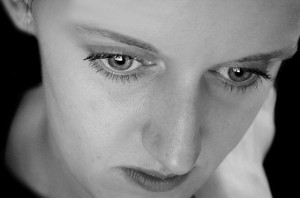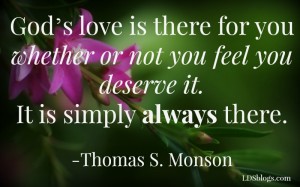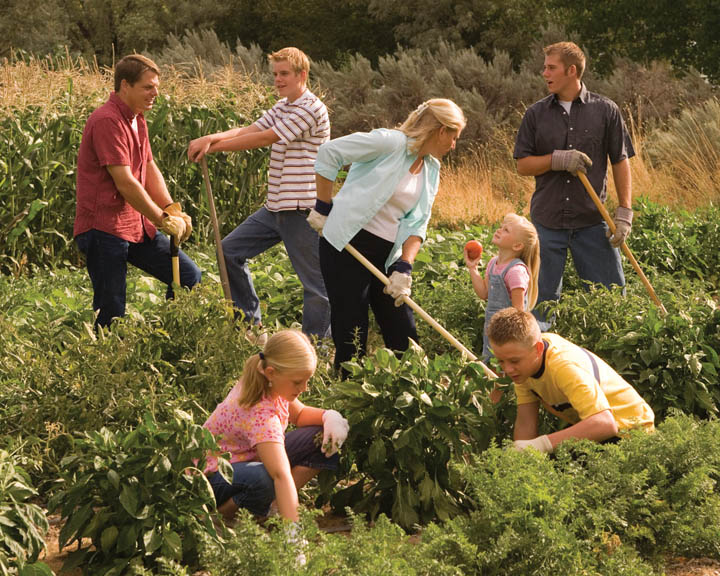It’s easier to talk about it now, because I’m not there. I can look back with objectivity and the comfort of distance. With my depression being hormone-based, yes, part of the problem is that I do keep having children. I’m an adult. I sometimes choose the hard thing I want over the easy thing. It’s worth it for me.
 PPD is like I’m suddenly experiencing life while in a bubble full of sludge. It’s hard to move. I can’t feel things normally. I can’t get close to other people, and everything is harder. Positive emotions struggle to make it through the sludge and if they do they are almost unrecognizable. Negative emotions seem to be attracted to it and fill it. There seems to be no limit to how many negative emotions can seep into my bubble. It only makes it more difficult to get anything done. Yet my post-partum depression is manageable.
PPD is like I’m suddenly experiencing life while in a bubble full of sludge. It’s hard to move. I can’t feel things normally. I can’t get close to other people, and everything is harder. Positive emotions struggle to make it through the sludge and if they do they are almost unrecognizable. Negative emotions seem to be attracted to it and fill it. There seems to be no limit to how many negative emotions can seep into my bubble. It only makes it more difficult to get anything done. Yet my post-partum depression is manageable.
By manageable I mean I sit around a lot, try desperately to motivate myself to keep the basics going, wish I could take a nap, force myself to call my mom and sister once a week and in general I muddle. I wade through mountains worth of negative thoughts about myself to find any shred of slightly positive. I cling to tiny moments of children cuteness. I force myself to take a shower or get outside…even just out the front door. I play uplifting music. I look at pictures to remind myself that this will end and this is not me. If I can recognize it enough to do something about it…I’m doing well. If I can recognize it enough to know it’s not me…it helps.
By manageable I mean with every pregnancy I’ve looked for something new that will help. With this last pregnancy I encapsulated my placenta. Although that’s fairly normal in the east and with practically every other mammal, most American women don’t preserve their placenta, make jerky of it, blend it and then swallow it in a capsule. It takes a certain amount of out-of-the-box thinking, desperation, and well, embracing your inner cannibal. Honestly, it was well worth it. It was fabulous for post-partum depression and recovery…but it wasn’t endless. The difference when the capsules ran out was so dramatic, I was reminded of just how chemical depression is. I then determined to try drugs–starting with something natural.
Two weeks later, I was standing at the kitchen sink doing dishes. The garbage disposal was running and I had the distinct thought enter my head that it’d be a great idea to stick my hand down into the running disposal. It was shocking. I turned off the disposal, turned off the water and walked to the medicine cabinet and pulled out the natural supplement I had been taking for post-partum depression and threw it away. I never had a similar thought again. Now maybe it would have evened out. Maybe I needed to give it more time. I could not take that risk. I didn’t want to ever have that thought again. It scared me.
Depression Medicine Isn’t a Sure Cure
 Having researched I’ve discovered that many medications intending to help depression have side effects that include suicidal thoughts. Think about that! This isn’t some back alley random drug deal, this is what everyone tells you to do…go see a doctor, go get help, maybe try medication if it gets bad. If you somehow find the motivation to go get help, it may work, or it may become infinitely worse.
Having researched I’ve discovered that many medications intending to help depression have side effects that include suicidal thoughts. Think about that! This isn’t some back alley random drug deal, this is what everyone tells you to do…go see a doctor, go get help, maybe try medication if it gets bad. If you somehow find the motivation to go get help, it may work, or it may become infinitely worse.
If you go to the optometrist, at the end of the appointment they don’t hand you glasses that on some days might help you see better, but could also make you blind! Would you try that? If you, the poor patient, did try on those crazy glasses and were made blind, we would not tell you then to drive yourself over, blind, to the optometrist and try again.
Sometimes we attempt to give a depressed person time. We think time heals all wounds–except for in cases of gangrene, when that gift of time kills.
Most people with depression muddle with varying degrees of success. There aren’t pink ribbons and official cures and protocols. At the edge of depression is an extremely dark abyss.
 Suicide is not committed by a normal, healthy person who just doesn’t want to have to work that hard anymore. They did not quit like we quit an overly long game of monopoly. Suicide isn’t laziness, or lack of a will to live. It is not selfishness. It is not a lack of love on their part. Suicide is a chemical takeover just as surely as cancer is. When someone dies of cancer we say they lost the battle with cancer. Can we say with suicide that someone lost the battle with depression? Is the chemical takeover somehow more their fault because of the location? Almost all of the fight is internal. There aren’t blood tests or numbers or protocol that applies every time. Depressed people don’t lose their hair, though they may not do their hair. There is far less time in a hospital bed and far more time attempting to get out of bed. It’s just not as clear and obvious. We don’t have concrete stages of depression. We just know so very little.
Suicide is not committed by a normal, healthy person who just doesn’t want to have to work that hard anymore. They did not quit like we quit an overly long game of monopoly. Suicide isn’t laziness, or lack of a will to live. It is not selfishness. It is not a lack of love on their part. Suicide is a chemical takeover just as surely as cancer is. When someone dies of cancer we say they lost the battle with cancer. Can we say with suicide that someone lost the battle with depression? Is the chemical takeover somehow more their fault because of the location? Almost all of the fight is internal. There aren’t blood tests or numbers or protocol that applies every time. Depressed people don’t lose their hair, though they may not do their hair. There is far less time in a hospital bed and far more time attempting to get out of bed. It’s just not as clear and obvious. We don’t have concrete stages of depression. We just know so very little.
Why do we look at depression and mental illness the way we do? Our diet affects our health, but if we eat ourselves to death, as in diabetes or high blood pressure or heart attacks, there isn’t a cloud of shame over the funeral. Goodness, you can smoke yourself to death with tobacco, get lung cancer and it’s, “oh how sad.” Lose the battle with depression and it’s whispers and guilt and wondering about moral failing. When we treat suicide that way, most depressed people are taking that same judgment on themselves.
What can we do when someone is depressed?
Let people be sad. This sounds counter intuitive. But honestly, did we ever let Robin Williams be sad? People want him making God laugh the second he got to heaven. Maybe he just wanted a hug or some quiet peace for a while. Maybe he is not a funny guy, he is just a guy. Can you imagine spending your whole life making other people happy while being incapable of making yourself feel anything? We do not demand our teacher friends constantly teach us. We do not assume doctor friends will be constantly focused on our health. Yet we may expect “the life of the party” to always make us laugh. Let people be people!
Let people be happy. Do not assume a smile means depression is gone and they are all better, any more than a cancer patient smiling means they are cured.
Recognize that they can’t just muscle through this. You can’t just fake it until you make it. With cancer we’d call that denial, and hope they take their illness seriously. I’m an athlete; I’m used to muscling through all sorts of things. Emotions and hormones…it’s just really not the same approach. I can’t change my body chemistry by sheer will power.
Keep being their friend. Call. Go over. Sit with them. Take them by the hand and get them out. Don’t make them enjoy it. Success is not making them smile; success is loving them. Shut out thoughts of how lazy or annoying they are. Remember you know them better than that. If you don’t know what to say, call the suicide hotline number for them and hand them the phone. Don’t buy into their negative thinking, but you don’t need to argue with their illogical statements any more than you should argue with my color-blind brother about the color of grass. . You don’t attempt to cure your friends with other diseases. Just be yourself. Then, KNOW that if they do lose the battle with depression, it is not your fault, any more than if they had lost the battle with cancer. You did not cause a chemical takeover. Love doesn’t cure all ills. Love supports all people. It is gentle and kind and constant. Love does not stop a chemical takeover of cancer or depression. It does comfort the person suffering. That is powerful.
More on LDS Blogs about Suicide:
Through Mormon Eyes: Coping with Suicide Novelist Anita Stansfield candidly discusses what she learned from her brother’s suicide.
Judge Not That Ye Be Not Judged
The Ugly Side of Beauty How college students banded Together to help rescue a suicidal friend.
About Britt Kelly
Britt grew up in a family of six brothers and one sister and gained a bonus sister later. She camped in the High Sierras, canoed down the Colorado, and played volleyball at Brigham Young University. She then served a mission to South Africa.
With all of her time in the gym and the mountains and South Africa, she was totally prepared to become the mother of 2 sons and soon to be 9 daughters. By totally prepared she means willing to love them and muddle through everything else in a partially sleepless state. She is mostly successful at figuring out how to keep the baby clothed, or at least diapered, though her current toddler is challenging this skill.
She feels children naturally love to learn and didn’t want to disrupt childhood curiosity with worksheets and school bells. She loves to play in the dirt, read books, go on adventures, watch her children discover new things, and mentor her children. Her oldest child is currently at a community college and her oldest son is going to high school at a public school. She loves to follow her children in their unique paths and interests.
She loves to write because, unlike the laundry and the dishes, writing stays done. Whenever someone asks her how she does it all she wonders what in the world they think she’s doing.
Twitter •








Thank you ,Thank you for this well described view on depression,having days that are up and down(for no apparent reason),I have come to the conclusion and acceptance that it is not my fault, I want to be happy-these feelings truly are not me. Your description of ppd is eloquent, I could never describe the whole condition as you did, it very much envelopes you like a bubble.
thanks for reading Jessica. I’m glad you have been able to separate yourself from your feelings. That is hard. It was good to talk with you today. IF nothing else I hope this post opens up the conversation.
PPD is certainly caused by the drop in hormones that occurs when we give birth. Bio-identical hormone replacement (that is with hormones that are exactly like our bodies naturally produce) can bring us out of depression without side effects. Progesterone is especially effective. It’s not called “the Happy Hormone” for nothing. To keep a viable pregnancy, a gal produces 400 mg a day, and then it goes away at birth. Find a specialist in natural hormone replacement, sometimes at “anti-aging” clinics. I’ve met many women for whom this has been easy and successful.
Gale, It is true that progesterone is helpful. It is also true that high levels of progesterone affect milk production. It’s a balance to figure out what will work for each woman. Sometimes stopping nursing is the answer. Sometimes progesterone and balancing formula and nursing. Sometimes it’s diet. Sometimes it’s hiring a babysitter so you can sleep. Sometimes a maid is helpful. Sometimes you just have to work through it.
Great comments. The trick is to find a medical professional who can help you find that balance. Still so much better than taking anti-depressants. Thanks for the ideas.